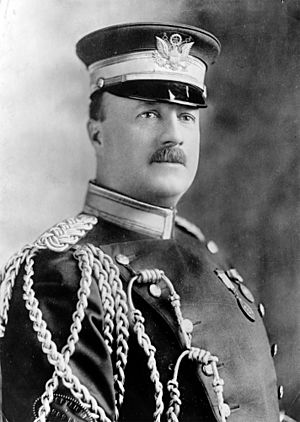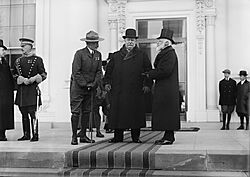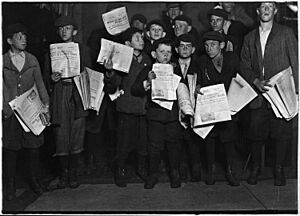Archibald Butt facts for kids
Quick facts for kids
Archibald Butt
|
|
|---|---|

Butt in 1909
|
|
| Born |
Archibald Willingham DeGraffenreid Clarendon Butt
September 26, 1865 Augusta, Georgia, U.S
|
| Died | April 15, 1912 (aged 46) |
| Education | Sewanee: The University of the South |
| Occupation | Journalist, soldier, presidential aide |
Archibald Willingham DeGraffenreid Clarendon Butt (born September 26, 1865 – died April 15, 1912) was an American Army officer. He is best known for serving as a special helper, called an aide, to two United States presidents: Theodore Roosevelt and William Howard Taft.
Before his military service, Butt worked as a newspaper reporter. He also spent two years as the First Secretary at the American embassy in Mexico. He joined the United States Volunteers in 1898 and worked in the Quartermaster Corps during the Spanish–American War. This corps is in charge of supplies for the army.
After some time in Washington, D.C., and Cuba, he became a military aide to Presidents Roosevelt and Taft. He was a very important advisor to both leaders on many different topics. His writings, especially his letters, are a valuable source of information about their time in office. Archibald Butt sadly died when the famous British ship, the Titanic, sank in 1912.
Contents
Early Life and Education
Archibald Butt was born in September 1865 in Augusta, Georgia. His parents were Joshua Willingham Butt and Pamela Robertson Butt. His family was not wealthy. His father passed away when Archibald was 14 years old, and he started working to help support his mother, sister, and younger brother.
With some financial help, Butt was able to attend the University of the South in Sewanee, Tennessee. His mother also worked as a librarian at the university. While in college, he became very interested in journalism and eventually became the editor of the college newspaper. He graduated in 1888.
After college, Butt became a reporter for the Louisville Courier-Journal in Kentucky for three years. He then worked for another newspaper, the Macon Telegraph, before moving to Washington, D.C. In Washington, he reported on national news for several Southern newspapers.
Butt was well-liked in Washington's social circles and met many important people. In 1895, he was asked to be the First Secretary at the American embassy in Mexico. He wrote articles and novels while in Mexico and returned to the U.S. in 1897.
Military Career and Service
On January 2, 1900, Archibald Butt became a captain in the United States Volunteers. He had always admired the military and wanted to serve his country. He was assigned to be a supply officer, meaning he helped manage and deliver supplies for the army.
Butt was ordered to take a ship called the Sumner to the Philippines. However, he changed his orders to get there faster on another ship, the USAT Dix. He was supposed to stop in Hawaii with his cargo of 500 mules. But he found the cost of animal feed and stables in Hawaii too high. So, he decided to continue directly to the Philippines. This was a risky decision, but none of the mules died, and he was praised for his quick thinking.
Butt stayed in the Philippines until 1904. He wrote many reports about caring for animals in tropical climates and about military transportation. His reports were highly praised by military leaders. In 1901, he officially became a captain in the Regular Army.
In 1904, Butt was sent back to Washington, D.C., where he became a depot quartermaster. This was an important job, and he was the lowest-ranking officer to ever hold it. In 1906, when there was a revolution in Cuba, Butt was quickly sent to manage the U.S. Army's supplies there. He set up a very organized supply center in just two days.
Working for Two Presidents

In March 1908, Butt was called back to Washington. President Theodore Roosevelt asked him to be his military aide in April 1908. Roosevelt chose Butt because he was impressed by his hard work and organizational skills in the Philippines. Also, William Howard Taft, who knew Butt well, recommended him.
Butt became one of President Roosevelt's closest friends. Even though Butt was a bit heavy, he and Roosevelt often went climbing, hiking, horseback riding, running, swimming, and playing tennis together. Butt also helped organize White House events, making them much smoother and more efficient.
When William Howard Taft became president in March 1909, he asked Butt to continue as his military aide. Butt kept helping with social events, but he also became very good at negotiating and understanding numbers. This made him Taft's main helper for federal budget issues. Butt even went with President Taft when he threw out the first ball at the opening baseball games for the Washington Senators in 1910 and 1911.
On March 3, 1911, Butt was promoted to the rank of major in the Quartermaster Corps.
By 1912, President Taft's first term was ending. Roosevelt, who had become friends with Taft, was thinking about running for president against him. Butt was very loyal to both men, and this situation made him feel very stressed and tired. His friend, Francis Davis Millet, asked President Taft to give Butt a vacation to rest. Taft agreed, and Butt went on a trip to Europe.
The Sinking of the Titanic
Archibald Butt started a six-week vacation in Europe on March 1, 1912, traveling with his friend Francis Millet. To return to the United States, Butt booked a first-class ticket on the RMS Titanic. He boarded the ship in Southampton, England, on April 10, 1912. Millet boarded later that day in Cherbourg, France.
On the night of April 14, Butt was playing cards in the first-class smoking room when the Titanic hit an iceberg. The ship sank about two and a half hours later, and over 1,500 people lost their lives. Butt and Millet were among those who died. Butt's body was never found.
Many stories were published in newspapers right after the disaster about what Butt did as the ship sank. These stories were often very dramatic and are hard to prove. Some accounts said that he acted like a ship's officer, helping to load and lower the lifeboats. Other stories claimed he used a gun to stop panicked men from rushing the lifeboats, or that he pulled a man out of a lifeboat so a woman could get in. One story even said he stopped passengers from breaking into the first-class areas to escape.
However, some historians disagree with these dramatic claims. They suggest that Butt most likely watched the ship's evacuation calmly. One story, supposedly told by a woman named Marie Young, said Butt helped her into a lifeboat, tucked a blanket around her, and said goodbye. But Young later wrote to President Taft, saying she never told such a story.
Even Butt's final moments are not fully known. Some eyewitnesses said they saw him standing calmly on deck or standing with John Jacob Astor IV as the ship went down. Other accounts said he returned to the smoking room and either stood quietly or went back to his card game.
Funerals, Memorials, and Papers
On May 2, 1912, a memorial service for Archibald Butt was held at his family home. About 1,500 people attended, including President Taft. Taft spoke at the service, saying that Butt's life was spent helping others and that he was like a son or brother to him. At a second ceremony in Washington, D.C., on May 5, Taft became very emotional while giving his speech.
Memorials
Several memorials were created to honor Archibald Butt:
- A cenotaph (a monument for someone buried elsewhere) was put up in the summer of 1913 in Arlington National Cemetery. Butt himself had chosen this spot earlier.
- In October 1913, the Butt-Millet Memorial Fountain, named for Archibald Butt and Francis Millet, was dedicated near the White House.
- In Augusta, Georgia, the Butt Memorial Bridge was dedicated in 1914 by former President Taft.
- The Washington National Cathedral has a large plaque dedicated to Major Archibald Butt.
A sculptor named Jorgen Dreyer created a bust (a sculpture of the head and shoulders) of Butt in 1912. It was called The Message and showed Butt on a base shaped like a ship on the ocean.
A government supply boat made of concrete was also named after Butt. It was built in 1920 and later sold to an aquarium in Miami, Florida, in 1934. It was eventually sunk in Biscayne Bay.
Papers
While working for Presidents Roosevelt and Taft, Butt wrote letters almost every day to his sister, Clara. These letters are very important because they give a unique look into the private lives and events of these two presidencies. They also show the personalities of Roosevelt and Taft.
These letters have been published twice. The first collection, The Letters of Archie Butt, Personal Aide to President Roosevelt, came out in 1924. A second set, Taft and Roosevelt: The Intimate Letters of Archie Butt, Military Aide, was published in 1930.
Butt's original letters are kept at the Georgia Department of Archives and History in Morrow, Georgia. Copies are also available at Emory University in Atlanta.
Personal Life
Archibald Butt lived in a large house at 2000 G Street NW with his friend, the painter Francis Davis Millet. Millet also died when the Titanic sank. Butt and Millet were known for hosting simple but large parties that were attended by important people, including members of Congress, Supreme Court justices, and President Taft himself.
Butt never married. At the time of his death, there were some rumors that he was about to get married, but none of these rumors were true.
Memberships
Archibald Butt was a member of several important organizations:
- In 1911, he joined the Georgia Society of the Cincinnati.
- He was also a member of the Army and Navy Club in Washington, D.C.
- He belonged to the District of Columbia Society of Colonial Wars.
- He was a member of the District of Columbia Society of the Sons of the American Revolution.
- He was a founding member of the Military Order of the Carabao.
Military Awards
- Philippine Campaign Medal
- Army of Cuban Pacification Medal
Archibald Butt in Fiction
Archibald Butt has appeared as a character in several novels:
- In Jack Finney's time travel novel, From Time to Time, Butt is sent to Europe by President Taft and former President Roosevelt to try and prevent World War I.
- James Walker's 1998 novel, Murder on the Titanic, includes Butt as a minor character.
- Michael Bockman's 2012 novel, The Titanic Plan, features Archibald Butt as a main character in a story about powerful business leaders.
- In the 2014 novel The Great Abraham Lincoln Pocket Watch Conspiracy by Jacopo della Quercia, Butt is shown as President Taft's close friend and pilot of a fictional presidential airship.
- In the 2021 time travel novel A Quarter Past: Dancing With Disaster, Butt is explored as a major character, based on his writings and letters.
Images for kids
See also
 In Spanish: Archibald Butt para niños
In Spanish: Archibald Butt para niños
 | George Robert Carruthers |
 | Patricia Bath |
 | Jan Ernst Matzeliger |
 | Alexander Miles |





